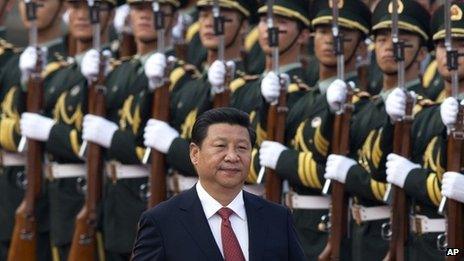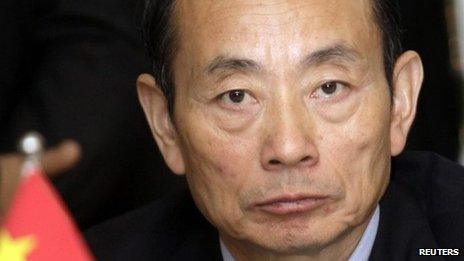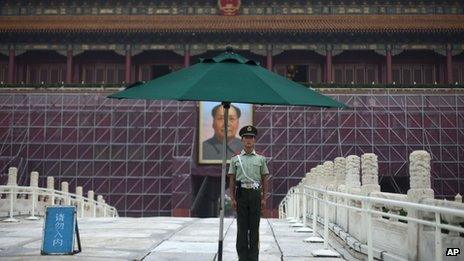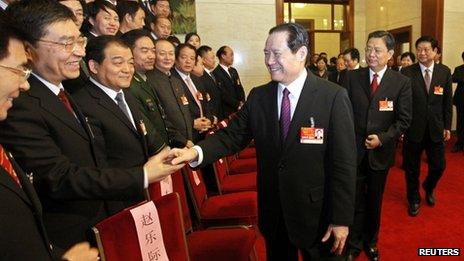How real is China's anti-corruption campaign?
- Published

Xi Jinping's anti-corruption campaign promises to capture officials of all ranks
China's anti-corruption campaign seems to be gathering steam by the day. Chinese citizens are subjected to a near-constant stream of headlines in the country's state media, announcing new investigations into business executives and political officials alike. Here are some answers to help explain the latest revelations from the party's campaign against bribery and corruption.
Q: The party just placed another top official, Jiang Jiemin, under investigation. Why does this matter?
Mr Jiang's downfall is important because of the position he held and party officials he is allied with.
Jiang Jiemin rose through the ranks of China's highly-profitable state-owned oil companies. Some believe he was netted by the anti-corruption campaign because of his previous position as the head of China's biggest oil giant, the China National Petroleum Corporation.
"This kind of state-owned enterprise makes a lot of money, so that's why the corruption campaign is looking into people there," said grassroots corruption investigator, Li Xinde.
"It's not just Jiang Jiemin who is under investigation. Several other oil executives have been arrested too."
Of course, one cannot ignore that Mr Jiang is not just a business executive. He is also the most senior official to be placed under the shadow of Chinese President Xi Jinping's anti-corruption campaign.
After repeated warnings that rampant corruption threatens to topple the Communist Party, Xi Jinping unleashed an anti-corruption campaign he promised would capture officials at all ranks of the party, both "tigers and flies".
But so far, only one "tiger", former Chongqing Party Chief Bo Xilai, has faced trial. Xi Jinping cannot even claim credit for Bo Xilai's high-profile implosion, since his downfall started before Mr Xi assumed power.
So China's president was under pressure to net a tiger, and Jiang Jiemin fits the description.
"Xi Jinping will receive tremendous praise [for this]," Cheng Li, a senior fellow at the Brookings Institute, said of the investigation into Mr Jiang.
"You cannot say they only want to deal with flies. They deal with tigers too."
Q: But doesn't Jiang Jiemin's status as a tiger offer him any protection? Can't his party 'cronies' help him out?
Perhaps not. Jiang Jiemin's rise through the party ranks is largely attributed to Zhou Yongkang, China's recently retired security czar.
Persistent rumours indicate that Mr Zhou continues to act as a rival to Xi Jinping and he might be the ultimate tiger who is toppled by Mr Xi's corruption witch hunt.
Citing unnamed sources, the South China Morning Post newspaper argued that Mr Zhou is already under investigation, though Beijing has yet to confirm that story.
Q: So what really explains Mr Jiang's downfall? His time in the oil sector or his political ties?

Jiang Jiemin was previously head of China's biggest oil giant
It is unclear. Jiang Jiemin appears to be vulnerable in both areas.
"The investigations of Bo Xilai and Jiang Jiemin are actually quite similar," said Hu Xingdou, a professor at the Beijing Institute of Technology.
"Bo Xilai's political problems with his former police chief, Wang Lijun, resulted in an investigation into his economic troubles. In Jiang Jiemin's case, he was investigated first for his economic mistakes, but now he is in trouble because of his political affiliations."
The true motives behind Jiang Jiemin's investigation might be revealed if his mentor, Zhou Yongkang, is also hauled before the courts on corruption charges.
Q: But Zhou Yongkang is retired. Why would Xi Jinping bother to investigate someone who is already out of power?
As a member of the elite Politburo Standing Committee, Zhou Yongkang ended his career at the very top of the Chinese Communist Party.
Like other retired leaders, he probably still holds a great deal of clout behind the scenes. Perhaps some believe that Xi Jinping wants to curtail that power, said Andrew Wedeman, a professor of political science at Georgia State University, who studies corruption in China.

The experts seem optimistic on China's anti-corruption campaign
"I can see good reasons why Xi Jinping would like to pick off all the people around Zhou Yongkang but leave him untouched," Dr Wedeman said.
"That would leave Zhou in an isolated position where he'd have to skate off into the sunset and absent himself from ongoing infighting regarding appointments, etcetera.
"On the other hand, I can see Xi going after Zhou Yongkang in order to really show: I am willing to pick off people who have been at the very senior levels."
Q: Does anyone in China actually take this corruption campaign seriously?
It seems so. Cynicism is high in a country where corruption among government officials is almost expected. However, the so-called "petro purge" at the state oil companies has won Xi Jinping many fans on China's chatty internet forums.
"Anti-corruption is the start of a Chinese dream," wrote a typical blogger on weibo, China's version of Twitter.
"This money could have been used to strengthen our national defence and improve people's lives. Party General Xi! Our whole nation supports you and embraces you!"
The experts seem optimistic too. Beijing professor, Hu Xingdou, said this campaign is far different from earlier, similar attempts to wipe out government corruption.
"This is an unprecedented effort to crack down on corruption, and the level of officials getting investigated is getting higher and higher, " he said.

Zhou Yongkang ended his career at the very top of the Communist Party
Xi's Tigers and Flies campaign appears to have gone on for such a long time, many seem to believe, and it has netted such a widespread group of party officials, that it is difficult to dismiss it as an empty political gesture.
Q: But many top officials rose to power through the same corrupt system they are now trying to clean up! Is the government really serious about stopping all corruption?
Yes, up to a point. The public's anger over the brazen corruption displayed by Rolex-toting officials seems to have hit boiling point, forcing the party to take the issue seriously.
Corruption exists in all societies, notes Andrew Wedeman, but the Communist Party is tasked with reducing China's corruption to a more manageable level.
"The Communist Party concentrates such power in the hands of officials that they are in a position to engage in corruption and cover it up at the same time," Mr Wedeman said.
"On the other hand, if the regime wants to go after someone, they go after people. They arrest, they convict and they imprison a substantial number of officials every year. So, in theory, it's possible to crack down on it."
- Published1 September 2013
- Published1 August 2013
- Published28 January 2013
- Published8 July 2013
- Published13 May 2013